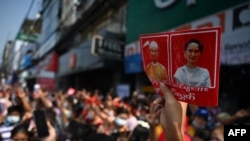The Myanmar military shut down the internet in the country on Saturday as thousands of people protested in Myanmar's largest city, Yangon.
It was the biggest street demonstration seen yet since this week's coup.
As the protests swelled, witnesses reported a shutdown of mobile data services and Wi-Fi.
Earlier, the military ordered mobile operators and internet providers to block access to Twitter and Instagram.
A temporary ban had already been put on Facebook, which counts half of the country's 54 million population as users.
Before the shutdown, hashtag #SaveMyanmar and #RespectOurVotes were trending, and many were using the platform to voice their opposition to the military coup.
The Ministry of Communications and Information did not immediately answer a request for comment but said previously it had blocked Facebook for the sake of "stability."
A Facebook spokesperson confirmed the block on Instagram to Reuters.
A spokesperson for Twitter said, "we will continue to advocate to end destructive government-led shutdowns."
Norwegian telecom Telenor, one of the largest in Myanmar, expressed its concern in a statement and said it had challenged the necessity of the order to authorities.
For the fourth consecutive night, Yangon residents banged pots and pans to show resistance against the military takeover and "drive out evil spirits."
There were signs of coup opponents growing bolder on Friday.
Staff from various government ministries put on red ribbons in the capital Naypyitaw and some teachers at a university in Yangon refused to work and held a three-finger salute as a symbol of resistance, borrowed from the Hunger Games film series.
On Saturday, Sean Turnell, an Australian economic adviser to Suu Kyi, said in a message to Reuters he was being detained.
This is the first known arrest of a foreign national in Myanmar since the army generals seized power on Monday alleging fraud in the November election.
Suu Kyi and at least 147 people have been detained since the coup, including activists, lawmakers and officials from her government.
That's according to the Assistance Association for Political Prisoners (AAPP).





